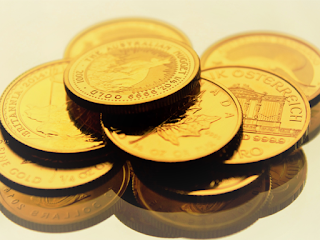There's more than meets the eye when it comes to gold's recent performance.
Last Wednesday, the Federal Reserve met market expectations by cutting interest rates for the first time since 2008. The 25-basis-point cut was priced in for much of July after the Fed shifted its monetary policy and, while definitely supportive of gold prices, did little to change the metal's upwards trajectory. Gold is still hovering near six-year highs, having ended the last trading session at $1,443 an ounce.
Although Fed Chair Jerome Powell left open the possibility of more rate cuts later this year to support the economy, an article on Newsmax reports that there are many other drivers pushing gold towards its third straight month of gains.
The metal's haven appeal has taken center stage amid widespread concerns over global growth and fears over a possible recession. According to a gauge by the Fed Bank of New York, the risk of a U.S. recession happening in the next 12 months is at its highest since 2008. The International Monetary Fund (IMF) once again reduced its growth outlook, already the lowest since the financial crisis, and added that things are unlikely to change in 2020.
Various global economies are playing their part in the IMF's grim outlook as each suffers its own industrial slowdown. Singapore, which boasted a prosperous economy not too long ago, now faces the risk of a recession as its exports fade. Shrinking factory output in countries like Germany and France also points to weaker growth in Europe in the near future, backed by the European Central Bank's own slashing of the growth forecast. China's economy has also found itself on shaky grounds due to increased pressure on its exporters.
Lakshman Achuthan, co-founder of the Economic Cycle Research Institute, recently told Bloomberg that countries worldwide are in the midst of a cyclical downturn in industrial growth. Achuthan expects this downturn to continue, adding that Powell had previously alluded to deeper problems holding the global economy back.
Besides recessionary concerns, gold has received plenty of support from wary buyers as a new crisis appears to flare up on a weekly basis states Newsmax. The long-standing trade dispute between the U.S. and China is now looking to envelop several other nations as well. Brexit remains an issue to be resolved three years after its vote was passed, and tensions in Hong Kong and over the Strait of Hormuz have also given investors pause.
James Steel, chief precious metals analyst at HSBC Securities, said that investors are turning to gold due to its liquidity and independence from any government, particularly during a time of mounting global debt and less appealing bond choices. Large speculators are once again bullish on gold's long-term outlook, having recently boosted their positions to their highest since September 2017. In a post published last month, billionaire investor and founder of Bridgewater Associates Ray Dalio spoke about a global economic paradigm shift that will include depreciating currencies and international conflict. Dalio added that gold and other precious metals will continue being outperformers in this new environment.


No comments:
Post a Comment
Note: Only a member of this blog may post a comment.